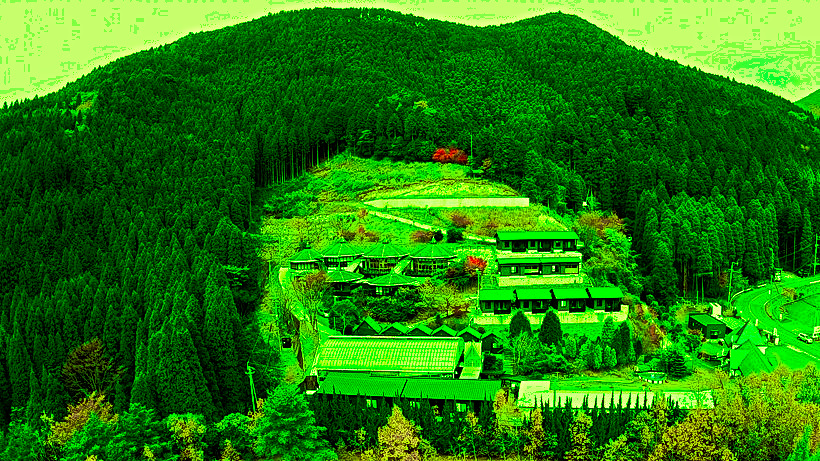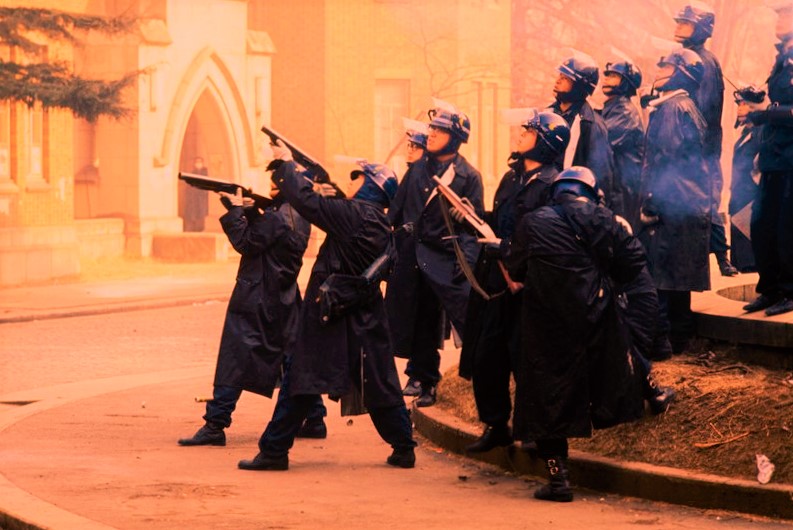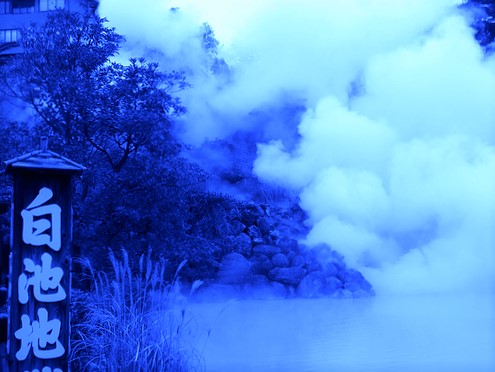A documentary on Japanese literary postmodernist Haruki Murakami, as well as a folktale from his novel, Colorless Tsukuru Tazaki and His Years of Pilgrimage. As the Guardian puts it: “Full of ambiguity and sex – all Murakami’s signature flourishes are here.”


Haida’s Story
An Excerpt By Haruki Murakami, Published in The Slate Book Review
One Saturday night, Tsukuru and Haida were up talking late as usual when they turned to the subject of death. They talked about the significance of dying, about having to live with the knowledge that you were going to die. They discussed it mainly in theoretical terms. Tsukuru wanted to explain how close to death he had been very recently, and the profound changes that experience had brought about, both physically and mentally. He wanted to tell Haida about the strange things he’d seen. But he knew that if he mentioned it, he’d have to explain the whole sequence of events, from start to finish. So as always, Haida did most of the talking, while Tsukuru sat back and listened.
A little past 11 p.m. their conversation petered out and silence descended on the room. At this point they would normally have called it a night and gotten ready for bed. Both of them tended to wake up early. But Haida remained seated, cross-legged, on the sofa, deep in thought. Then, in a hesitant tone, something unusual for him, he spoke up.
“I have a kind of weird story related to death. Something my father told me. He said it was an actual experience he had when he was in his early twenties. Just the age I am now. I’ve heard the story so many times I can remember every detail. It’s a really strange story—it’s hard even now for me to believe it actually happened— but my father isn’t the type to lie about something like that. Or the type who would concoct such a story. I’m sure you know this, but when you make up a story the details change each time you retell it. You tend to embellish things, and forget what you said before. … But my father’s story, from start to finish, was always exactly the same, each time he told it. So I think it must be something he actually experienced. I’m his son, and I know him really well, so the only thing I can do is believe what he said. But you don’t know my father, Tsukuru, so feel free to believe it or not. Just understand that this is what he told me. You can take it as folklore, or a tale of the supernatural, I don’t mind. It’s a long story, and it’s already late, but do you mind if I tell it?”
Sure, Tsukuru said, that would be fine. I’m not sleepy yet.
* * *
“Why do people have to be this lonely? What’s the point of it all? Millions of people in this world, all of them yearning, looking to others to satisfy them, yet isolating themselves. Why? Was the earth put here just to nourish human loneliness?” — Haruki Murakami, “Sputnik Sweetheart“
httpvh://youtu.be/NI6LyqO9i8Y
Haruki MURAKAMI: In SEARCH of this elusive WRITER — BBC Documentary
“When my father was young, he spent a year wandering around Japan,” Haida began. “This was at the end of the 1960s, the peak of the counterculture era, when the student movement was upending universities. I don’t know all the details, but when he was in college in Tokyo, a lot of stupid things happened, and he got fed up with politics and left the movement. He took a leave of absence from school and wandered around the country. He did odd jobs to earn a living, read books when he had the time, met all sorts of people, and gained a lot of real-life, practical experience. My father says this was the happiest time of his life, when he learned some important lessons. When I was a kid, he used to tell me stories from those days, like an old soldier reminiscing about long-ago battles in some far-off place. After those bohemian days, he went back to college, and returned to academic life. He never went on a long trip ever again. As far as I know, he’s spent his time since just shuttling back and forth between home and his office. It’s strange, isn’t it? No matter how quiet and conformist a person’s life seems, there’s always a time in the past when they reached an impasse. A time when they went a little crazy. I guess people need that sort of stage in their lives.”


That winter Haida’s father worked as general handyman at a small hot-springs resort in the mountains of Oita Prefecture in southern Japan. He really liked the place and decided to stay put for a while. As long as he completed his daily tasks, and any other miscellaneous jobs they asked him to undertake, the rest of the time he could do as he pleased. The pay was minimal, but he got a free room plus three meals a day, and he could bathe in the hot springs as often as he liked. When he had time off he lay around in his tiny room and read. The other people there were kind to this taciturn, eccentric Tokyo student, and the meals were simple but tasty, made with fresh, local ingredients. The place was, above all, isolated from the outside world—there was no TV reception, and the newspapers were a day late. The nearest bus stop was three kilometers down the mountain, and the only vehicle that could make it from there and back on the awful road was a battered old jeep owned by the inn. They’d only just recently gotten electricity installed.
In front of the inn was a beautiful mountain stream where one could catch lots of firm, colorful fish. Noisy birds were always skimming over the surface of the stream, their calls piercing, and it wasn’t unusual to spot wild boar or monkeys roaming around nearby. The mountains were a treasure trove of edible wild plants. In this isolated environment, the young Haida was able to indulge himself in reading and contemplation. He no longer cared what was happening in the real world.
Two months into his stay at the inn, he began to chat with a guest who was staying there. The man appeared to be in his mid-forties. He was tall, with lanky arms and legs, and short hair. He wore gold-framed glasses, and he had a receding hairline, which made the top of his head as smooth as a freshly laid egg. He had walked up the mountain road alone, a plastic travel bag hanging from one shoulder, and had been staying at the inn for a week. Whenever he went out, he invariably dressed in a leather jacket, jeans, and work boots. On cold days he would add a wool cap and a navy-blue muffler. The man’s name was Midorikawa. At least that was the name he signed in the guest book at the inn, along with an address in Koganei City in Tokyo. He meticulously paid in cash every morning for the previous night’s stay.
(Midorikawa? “Green river.” Another person with a color, Tsukuru thought, but said nothing and listened to the rest of the story.)
Midorikawa didn’t do anything special. He spent time soaking in the open-air bath, took walks in the nearby hills, or lay in the kotatsu—the foot-warmer table— reading the paperbacks he’d brought with him (mostly mindless mysteries). In the evening he’d enjoy two small bottles of hot sake—no more, no less. He was as taciturn as Haida’s father, and never spoke unless absolutely necessary, though it didn’t seem to bother the people at the inn. They were used to these sort of guests. All of the people who came to this remote, backwoods hot springs were odd, those who stayed long term even more so.
“Anyone who falls in love is searching for the missing pieces of themselves. So anyone who’s in love gets sad when they think of their lover. It’s like stepping back inside a room you have fond memories of, one you haven’t seen in a long time.” — Haruki Murakami


One morning, just before dawn, Haida was soaking in the open-air hot spring next to the river when Midorikawa came to bathe and started talking to him. For some reason Midorikawa seemed to have taken a deep interest in this young odd-job worker. It might have stemmed, in part, from the time he saw Haida on the porch reading a book by Georges Bataille.
I’m a jazz pianist from Tokyo, Midorikawa said. I had some personal disappointments, and the daily grind was wearing me down, so I came alone to this quiet place deep in the mountains, hoping to rest up. Actually, I set out without any plan, and just happened to land here. I like it, everything’s stripped to the bare essentials. I hear you’re from Tokyo too?
As he soaked in the hot water in the dim light, Haida explained, as briefly as he could, his own situation. How he’d taken a leave of absence from college and was traveling around the country. Besides, the campus was blockaded, he added, so there was no reason to stay in Tokyo.
Aren’t you interested in what’s going on now in Tokyo? Midorikawa asked. It’s quite a spectacle. One uproar after another, every day. Like the whole world’s turned upside down. Don’t you feel bad that you’re missing out?
The world isn’t that easily turned upside down, Haida replied. It’s people who are turned upside down. I don’t feel bad about missing that. Midorikawa seemed to appreciate the younger man’s curt, direct way of speaking.
I wonder if there’s anyplace around here where I might play the piano, Midorikawa asked Haida.
There’s a junior high school on the other side of the mountain, Haida replied. After school’s out for the day, they might let you play the piano in their music room. Midorikawa was happy to hear this. If it isn’t any trouble, he said, could you take me there? Haida relayed this request to the inn’s owner, who instructed him to escort Midorikawa to the school. The owner phoned the junior high to set it up. After lunch, the two of them hiked over the mountain. The rain had just stopped falling, so the path was slippery, but Midorikawa, shoulder bag slung diagonally across his shoulders, strode quickly, sure-footed, down the path. Though outwardly a city person, he was much more robust than he appeared.
The keyboard of the old upright piano in the music room was uneven, and the tuning was off, but overall it was tolerable. Midorikawa sat down on the creaky chair, stretched out his fingers, ran through all eighty-eight keys, then began trying out a few chords. Fifths, sevenths, ninths, elevenths. He didn’t seem too pleased with the sound, but appeared to get a certain physical satisfaction from the mere act of pressing down on the keys. As Haida watched the nimble, resilient way his fingers moved over the keyboard, he decided that Midorikawa must be a pretty well-known pianist.
After trying out the piano, Midorikawa took a small cloth bag from his shoulder bag and gingerly placed it on top of the piano. The bag was made of expensive cloth, the opening tied up with string. Somebody’s funeral ashes, maybe? Haida thought. It seemed like placing the bag on top of the piano was his habit, whenever he played. You could tell by the practiced way he went about it.
Midorikawa hesitantly began playing “’Round Midnight.” At first he played each chord carefully, cautiously, like a person sticking his toes into a stream, testing the swiftness of the water and searching for a foothold. After playing the main theme, he started a long improvisation. As time went by, his fingers became more agile, more generous, in their movements, like fish swimming in clear water. The left hand inspired the right, the right hand spurred on the left. Haida’s father didn’t know much about jazz, but he did happen to be familiar with this Thelonious Monk composition, and Midorikawa’s performance went straight to the heart of the piece. His playing was so soulful it made Haida forget about the piano’s erratic tuning. As he listened to the music in this junior-high music room deep in the mountains, as the sole audience for the performance, Haida felt all that was unclean inside him washed away. The straightforward beauty of the music overlapped with the fresh, oxygen-rich air and the cool, clear water of the stream, all of them acting in concert. Midorikawa, too, was lost in his playing, as if all the minutiae of reality had disappeared. Haida had never seen someone so thoroughly absorbed in what he was doing. He couldn’t take his eyes off Midorikawa’s ten fingers, which moved like independent, living creatures.
“Silence, I discover, is something you can actually hear.” — Haruki Murakami, “Kafka on the Shore”
httpvh://youtu.be/ojtuDUbRoxI
Thelonious Monk, Round Midnight (1957)
In fifteen minutes Midorikawa finished playing, took out a thick towel from his shoulder bag, and carefully wiped his perspiring face. He closed his eyes for a while as if he were meditating. “Okay,” he finally said, “that’s enough Let’s go back.” He reached out, picked up the cloth bag on the piano, and gently returned it to his shoulder bag.
“What is that bag?” Haida’s father ventured to ask.
“It’s a good-luck charm,” Midorikawa said simply.
“Like the guardian god of pianos?”
“No, it’s more like my alter ego,” Midorikawa replied, a weary smile rising to his lips. “There’s a strange story behind it. But it’s pretty long, and I’m afraid I’m too worn out to tell it right now.”
Haida stopped and glanced at the clock on the wall. Then he looked at Tsukuru. He was, of course, Haida the son, but Haida the father had been his same age in this story, and so the two of them began to overlap in Tsukuru’s mind. It was an odd sensation, as if the two distinct temporalities had blended into one. Maybe it wasn’t the father who had experienced this, but the son. Maybe Haida was just relating it as if his father had experienced it, when in reality he was the one who had. Tsukuru couldn’t shake this illusion.
“It’s getting late. If you’re sleepy I can finish this later.”
No, it’s fine, Tsukuru said. I’m not sleepy. In fact, he’d gotten his second wind, and wanted to hear the rest of the story.
“Okay, then I’ll continue,” Haida said. “I’m not very sleepy either.”
For the Entire Story, Please see The Slate Review of Books.
Haruki Murakami was born in Kyoto in 1949 and now lives near Tokyo. His work has been translated into more than 50 languages.
H-T: Open Culture








